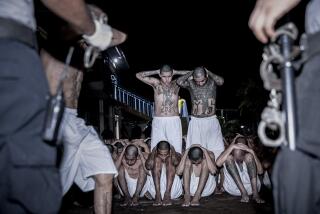Sarajevo Siege Creating City of Suicidal Children, U.N. Finds
- Share via
SARAJEVO, Bosnia-Herzegovina — Almost two years of Serbian rebel bombardment of Sarajevo has created a community of suicidal children who have grown convinced they have no future, officials of the U.N. Children’s Fund said Tuesday in an alarming report on the war’s youngest victims.
Two-thirds of the children surveyed claimed to have been in a situation in which they feared they were about to die, UNICEF officials reported after interviewing 1,505 children in this besieged capital. Almost all of them--97.3%--had lived through shelling of their immediate neighborhoods.
The majority reported they had witnessed a killing or maiming, that they had been shot at by snipers and that their homes had been attacked or damaged during the war. One often-expressed fear that agency officials say is unique to this crisis is a belief among many children that their lives will be ended by freezing to death.
The result is a generation that has become numb to danger, warned Rune Stuvland, the U.N. agency’s psychosocial adviser for the former Yugoslav federation.
Parents also interviewed as part of the study conducted last summer claimed they now see their children taking foolish risks with personal safety because they have become convinced they will die anyway and “they just don’t care anymore,” Stuvland reported.
“Some children are exhibiting suicidal tendencies--not actively attempting suicide but taking extreme risks,” said the specialist in trauma psychology.
Because Sarajevo was a developed, relatively affluent city prior to the siege, its residents have proven more vulnerable to the horrors and disruptions of protracted violence than more scattered, rural populations affected by conventional wars in Third World countries.
Almost 37% of the children interviewed said a member of their immediate family had been killed or wounded in the war; 23% had been expelled from their homes as part of this war’s signature, horrific act--”ethnic cleansing.”
“It doesn’t take much imagination to realize these experiences have severe impact on children as they are growing up,” Stuvland said.
“Children are supposed to grow up making plans for the future,” he added, noting that Sarajevo’s children have stopped thinking beyond the difficulties of each day under a destructive bombardment that has continued undeterred for 22 months. “They actually live with the belief that their future is gone, that tomorrow it may be their turn to die.”
Aside from the resignation he said has come over many children, others reported severe depressive reactions and physical traumas. One-third reported frequent stomachaches, which agency social workers say are probably psychosomatic; 22.5% said they feel life is not worth living.
At least 1,500 children have been killed in Sarajevo alone since Serbian nationalists rebelled against Bosnia-Herzegovina’s vote for independence in March, 1992. There are no accurate figures available for the percentage of young among the 200,000 reported dead or missing throughout the embattled republic, but the majority of victims have been civilians.
More to Read
Sign up for Essential California
The most important California stories and recommendations in your inbox every morning.
You may occasionally receive promotional content from the Los Angeles Times.














